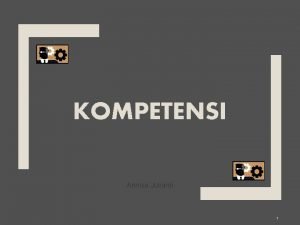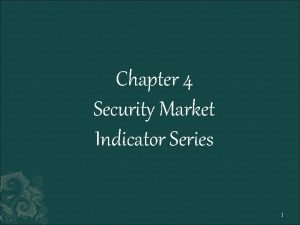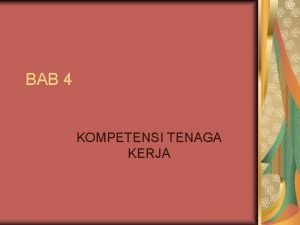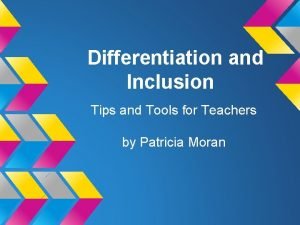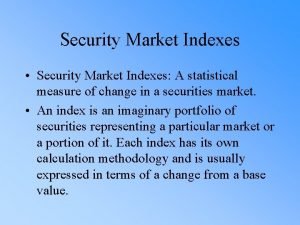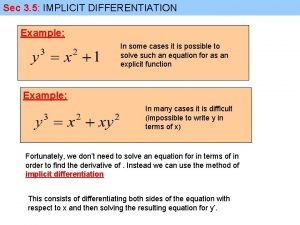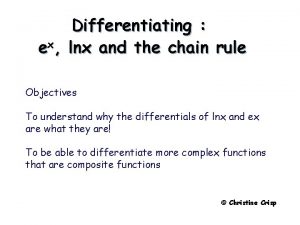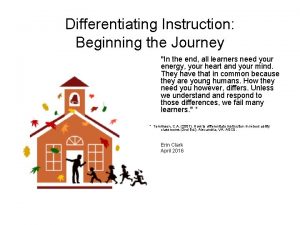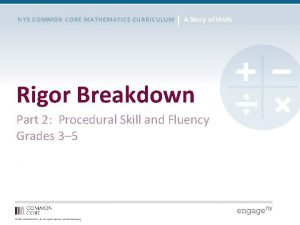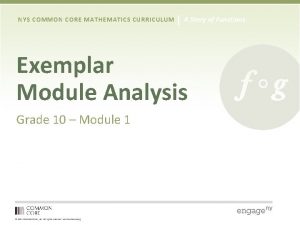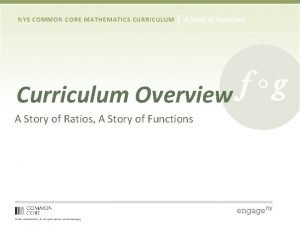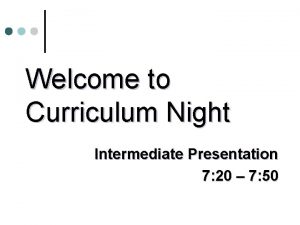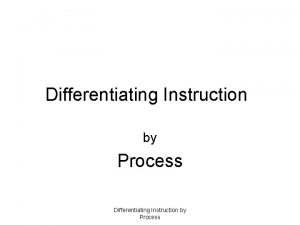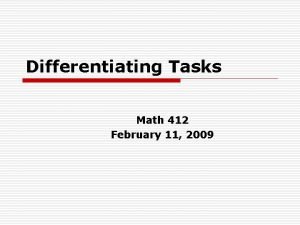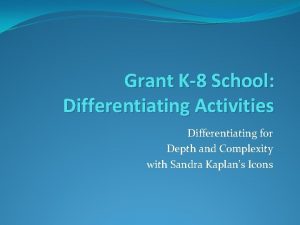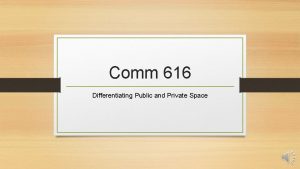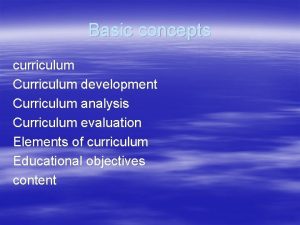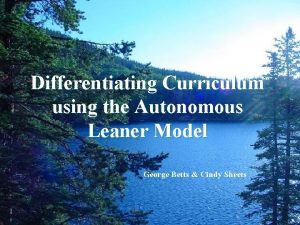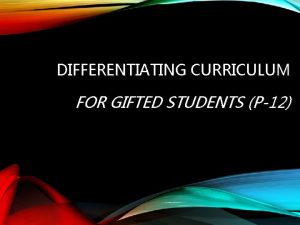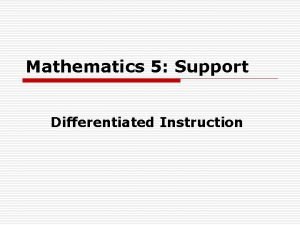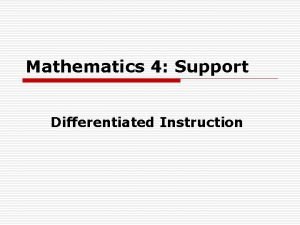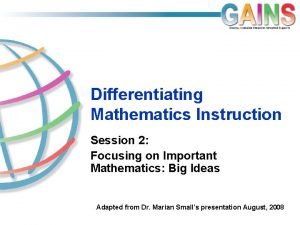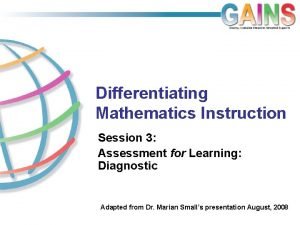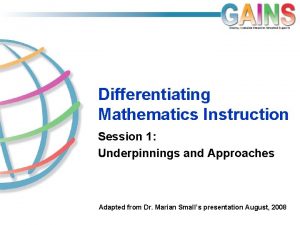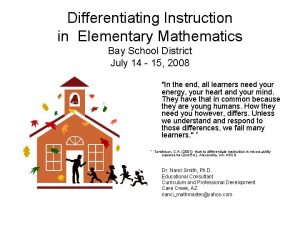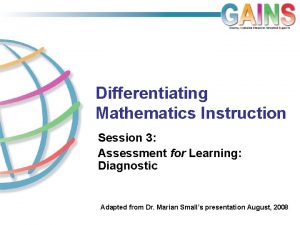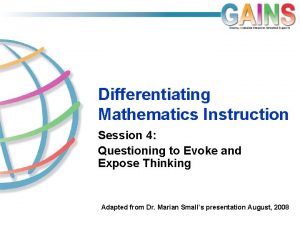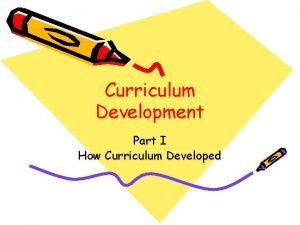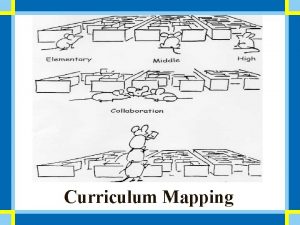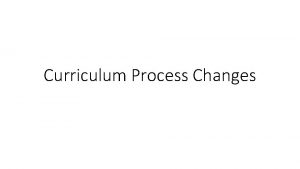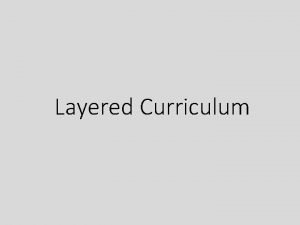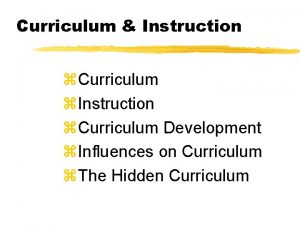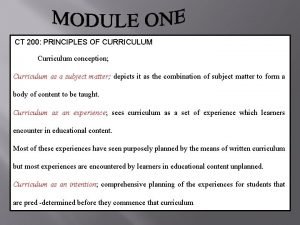Welcome to Mathematics Differentiating the Mathematics curriculum F6
























- Slides: 24

Welcome to ‘Mathematics Differentiating the Mathematics curriculum (F-6)’ The webinar will start promptly at 3: 45 pm on 21 August 2019.

Differentiating the Mathematics curriculum (F-6) Crystal Afitu F-10 Mathematics Curriculum Manager August 21 st, 2019

Purpose q. To develop an understanding of differentiation q. To understand how to use the F-10 Mathematics curriculum to support differentiation within your classroom

What is differentiation? Differentiation “refers to methods teachers use to extend the knowledge and skills of every student in every classroom, regardless of their starting point” (DET, 2019) Differentiation benefits students across the learning continuum, it is inclusive of all students of all potential.

Objective of differentiation The objective is to lift the performance of all students, including those who are not reaching and those ahead of year level expectations • Identifying what students currently know • What they should learn next • Identify gaps in their knowledge and skills for targeted learning intervention.

Knowing your content Student learning Curriculum (what) Pedagogy (how) Assessment (how well) Reporting (where)

The Mathematics Curriculum

Assessment q. Formative assessment answers the question: what does the student need to learn next? q. Summative assessment answers the question: what has the student learnt?

What assessments do you use at your school? Have some time to think about what assessments you complete at your school. q. Is it formative or summative? q. Is the information or data you are obtaining valuable? q. Do you understand what to do, or how to read your data?

Off-level testing

Validation q The VCAA has produced Annotated Student Work Samples to help with identifying achievement against the curriculum. q Each set of work samples was produced by students working at a particular level of the Victorian Curriculum Mathematics. Evidence of student achievement has been annotated, including evidence of both knowledge and skills addressed in the relevant achievement standard and some common misconceptions in student learning in Mathematics.

Analysing Data

Fluid groupings Fluid grouping (otherwise known as flexible grouping) is when teaching groups will often change depending on the curriculum content or the skill you are teaching. Your groups may also vary on learning styles and interests. It is important students don’t view grouping as ‘Streaming’ and that students are grouped in a manner to best promote success in their learning.

Planning

Curriculum Mapping Templates

Question? Consider the assessments that you currently complete within your school and/or class. q. How effectively does this allow you to determine the Zone of Proximal Development (ZPD) with your students? q. How is your assessment aligned with the Victorian Curriculum?

Numeracy Learning Progressions The Numeracy Learning Progressions outline a sequence of indicators of increasingly sophisticated understanding and skills in numeracy. The Numeracy Learning Progressions can be used as a tool to facilitate a deeper understanding of numeracy development. They can be used to support all teachers in Victorian schools in developing a comprehensive view of numeracy and how numeracy skills develop over time.

Review of the Numeracy Learning Progressions

What this is not This approach to formative assessment and planning is not ‘teaching to the test’. Teaching to the test refers to when teachers covers content that focusses on a future test, with hopes of students receiving a high score (Summative Assessment)

Questions?

Next step … We would like to develop more professional learning relevant to your needs. The following survey will assist us in this process.

Recommended Reading Griffin, P. E. (2018). Assessment for teaching. Cambridge ; New York, NY ; Port Melbourne ; Delhi ; Singapore: Cambridge University Press. High impact teaching strategies: Excellence in teaching and learning. (2017). Melbourne: Victoria. Dept of Education and Training. doi: https: //www. education. vic. gov. au/documents/school/teachers/support/highimpactteachstrat. pdf How to create a Guttman Chart and find Zones of Personal Development. (n. d. ). Retrieved from https: //fuse. education. vic. gov. au/Resource/Landing. Page? Object. Id=7 ad 54959 -ae 82 -4 a 0 b-a 3 fc-5 e 8 ca 4 b 2105 b Note 16: Excellence in differentiation to increase engagement and learning outcomes. (n. d. ). Retrieved from https: //www. education. vic. gov. au/school/teachers/teachingresources/practice/improve/Pages/ppn 16. aspx Subban, P (2006). Differentiated instruction: A research basis Retrieved from: https: //files. eric. ed. gov/fulltext/EJ 854351. pdf The Victorian Curriculum F– 10. (n. d. ). Retrieved from https: //victoriancurriculum. vcaa. vic. edu. au/ Victorian Curriculum -F-10: Numeracy Learning Progressions. (n. d. ). Retrieved from https: //www. vcaa. vic. edu. au/foundation 10/Pages/viccurriculum/numeracy/intro. aspx

Contact Crystal Afitu Mathematics F-10 Curriculum Manager Email: afitu. crystal. c@edumail. vic. gov. au Phone: (03) 9032 1746 Monday and Thursday (03) 9651 -3943 Tuesday and Wednesday

Curriculum support For advice regarding the F-10 curriculum, contact VCAA F-10 Unit: E. vcaa. f 10. curriculum@edumail. vic. gov. au T. 9032 1788
 Contoh differentiating competencies
Contoh differentiating competencies Mark knapp's stages of coming apart
Mark knapp's stages of coming apart Differentiating factors in constructing market indexes
Differentiating factors in constructing market indexes Differentiating acceleration
Differentiating acceleration Contoh threshold competencies
Contoh threshold competencies Differentiating process examples
Differentiating process examples Derivatives of inverse trigonometric functions
Derivatives of inverse trigonometric functions Differentiating factors in constructing market indexes
Differentiating factors in constructing market indexes Differentiating process examples
Differentiating process examples Implicit differentiation trigonometry
Implicit differentiation trigonometry Ex lnx
Ex lnx Differentiating content
Differentiating content Nys common core mathematics curriculum
Nys common core mathematics curriculum Nys common core mathematics curriculum
Nys common core mathematics curriculum Whats common
Whats common Welcome welcome this is our christmas story
Welcome welcome this is our christmas story Welcome to curriculum night
Welcome to curriculum night Welcome to curriculum night
Welcome to curriculum night Một số thể thơ truyền thống
Một số thể thơ truyền thống Thế nào là hệ số cao nhất
Thế nào là hệ số cao nhất Ng-html
Ng-html Hệ hô hấp
Hệ hô hấp Bảng số nguyên tố
Bảng số nguyên tố đặc điểm cơ thể của người tối cổ
đặc điểm cơ thể của người tối cổ Các châu lục và đại dương trên thế giới
Các châu lục và đại dương trên thế giới
